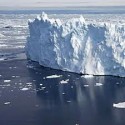The ocean is the cornerstone of our life-support system

Two trillion dollars is an astounding amount of money.
Imagine this: The day Julius Caesar is born you are given $2 trillion. Then, you manage to spend $2 million every single day. After this tiring experience, you’d still have several hundred billion dollars in your pocket. Besides having really big pockets and a long lifespan, you might be one of the few people on the planet who understands the crisis our oceans face.
Two trillion dollars ($2,000,000,000,000) is the amount that the global economy stands to lose by 2100 if we continue our current use and abuse of the ocean environment. That’s the news, according to a 300-page report called “Valuing the Ocean”. Coordinated by the Swedish-based Stockholm Environment Institute, the report concludes that human activities such as oil spills, fertilizer use, carbon emissions and other pollution will have a devastating impact on the economic benefits the ocean provides.
Most of us think immediately of the value of fish and shellfish stocks. But the costs of degrading the environment include rising sea levels, storms, loss of tourism and the ocean as a carbon sink.
The executive summary of the report says it best, “The ocean is the cornerstone of our life-support system. It covers over 70 percent of our planet and generates the oxygen in every second breath we take; it has cushioned the blow of climate change by absorbing 25-30 percent of all anthropogenic carbon emissions and 80 percent of the heat added to the global system; it regulates our weather and provides food for billions of people. The ocean is priceless.”
But that’s not the end of it. Because of these collective impacts, $600 million of services provided by the ocean will be lost every year.
We humans like to use the ocean, but we don’t seem to be considering the impacts we have, especially taken collectively. Governments and decision-makers are not properly considering the links between human activities and loss of productive ecosystems. Burning fossil fuels is putting carbon in the atmosphere and acidifying our oceans. Industrial fishing practices and lack of management have depleted 90 per cent of the world’s large fish, such as tuna, cod and halibut.
The co-author of the report, University of British Columbia fisheries economist Rashid Sumaila, hopes that the report will help us make better decisions. “By stressing the links between multiple marine stressors and the huge value of the vital services that the ocean provides to humankind we [the report authors] hope to help kick-start decisive, integrated action to strengthen ocean governance and management across all scales, from local to global.”
The report states, “the ocean is the victim of a massive market failure.” It really should say, “The market is a victim of a massive market failure.” The ocean doesn’t need any money. It’s the market that is losing the $2 trillion because it has failed to properly account for its own impacts—actively writing the benefits on the ledger sheet while ignoring the deficits.
This Enron accounting has to stop. We can’t afford to keep trashing our oceans: there’s a whole lot more than $2 trillion at stake
By Panos Grames, Communications Specialist





Leave a comment!